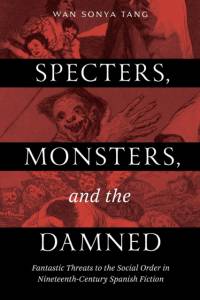Om Specters, Monsters, and the Damned
Specters, Monsters, and the Damned examines a rich selection of Spanish fantastic literature to illustrate how the language of the supernatural expresses the fears of complex societies beset by dizzying change and perceived decline. Throughout the nineteenth century, amid governmental upheavals and imperial losses, Spain's dominant political, legal, and scientific voices constructed the prototypical citizen as male, middle-class, and "ethnically pure." The role of realist novels by canonical authors like Benito Pérez Galdós, Emilia Pardo Bazán, and Leopoldo Alas in forging this Spanish identity has been meticulously examined over the last half century, to the exclusion of many other genres. This book complements existing scholarship by demonstrating how a neglected corpus of late nineteenth- and turn-of-the-century fantastic short fictions, many by the same canonical authors, engages with processes of national identity formation in unexpected and ambiguous ways. Tang offers innovative readings of eleven fantastic short stories and one novella as they first appeared, some serialized and others illustrated, in Spanish periodicals from the late 1800s and early 1900s. Drawing on original archival research, she demonstrates how these stories--in which the everyday is suddenly and inexplicably disrupted by the supernatural--often employ gothic imagery (specifically that of the specter, the monster, and the curse) to depict as threatening those who deviate from cultural norms in terms of class, gender, and race. Tang argues, however, that these unsettling, open-ended narratives likewise allow readers to question how and why certain designated groups are privileged by society. She contends that the fantastic depiction of reality as unstable in these works ultimately facilitates an interrogation of those values that are accepted as natural by the reigning social order, gesturing toward the inhumanity not of the marginalized, but of the dominant group.
Visa mer

